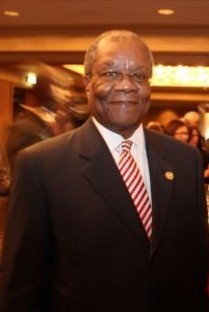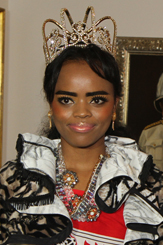
Eswatini is an absolute monarchy with constitutional provisions and Swazi law and Custom. The head of state is the king or Ngwenyama, currently King Mswati III, who ascended to the throne in 1986 after the death of his father King Sobhuza II in 1982 and a period of regency. According to the constitution of Eswatini, the king and Ingwenyama is a symbol of unity and the eternity of the Swazi nation. By tradition, the king reigns along with his mother or a ritual substitute, the Ndlovukati. The former was viewed as the administrative head of state and the latter as a spiritual and national head of state, with real power counterbalancing that of the king, but during the long reign of Sobhuza II the role of the Ndlovukati became more symbolic. The king appoints the prime minister from the legislature and also appoints a minority of legislators to both chambers of Libandla (parliament), with help from an advisory council. The king is allowed by the constitution to appoint some members to parliament for special interests. These special interests are citizens who might have been left out by the electorate during the course of elections or did not enter as candidates. This is done to balance views in parliament. Special interests could be people of gender, race, disability, business community, civic society, scholars, chiefs and so on. The Senate consists of 30 members, of which some are appointed by the king on recommendation of the advisory council and others elected by the lower house. The House of Assembly has 65 seats, of which 55 are occupied by elected representatives from the 55 constituencies around the country, and 10 are appointed by the king on recommendation of the advisory council. The attorney general is the ex-officio member. Elections are held every five years.

Artifacts indicating human activity dating back to the early Stone Age have been found in the Kingdom of Eswatini. The earliest known inhabitants of the region were Khoisan hunter-gatherers. Later, the population became predominantly Nguni during and after the great Bantu migrations. People speaking languages ancestral to the current Sotho and Nguni languages began settling no later than the 11th century. The country now derives its name from a later king named Mswati II. Mswati II was the greatest of the fighting kings of Eswatini, and he greatly extended the area of the country to twice its current size. The people of Eswatini largely belong to a number of clans that can be categorized as Emakhandzambili, Bemdzabu, and Emafikamuva, depending on when and how they settled in Eswatini.

Mswati III is the Ngwenyama (King) of Eswatini and head of the Swazi royal family. He heads an absolute monarchy, as he has veto power over all branches of government and is constitutionally immune from prosecution.

The Swazi or Swati are a Bantu ethnic group native to Southern Africa, inhabiting Eswatini, a sovereign kingdom in Southern Africa, and South Africa's Mpumalanga province. AmaSwati are part of the Nguni-language speaking peoples whose origins can be traced through archaeology to East Africa where similar traditions, beliefs and cultural practices are found.

Sobhuza II was Ngwenyama (King) of Swaziland for 82 years and 254 days, the longest verifiable reign of any monarch in recorded history.

Ntfombi has been Queen Mother of Eswatini since 1986. She was also regent of Eswatini from 1983 to 1986. She is the mother of King Mswati III.
Sobhuza I was king of Eswatini, from 1815 to 1850. Born around the year 1788, his father was King Ndvungunye, and his mother was Somnjalose Simelane. He was called Somhlolo, meaning "Mysterious man", upon his birth because his father, Ndvungunye, was struck by lightning. When Sobhuza was king, Lojiba Simelane, instead of his mother, Somnjalose was Queen Mother because Somnjalose was an inhlanti or support bride to Lojiba. Somhlolo is a greatly revered king of Eswatini. He had his first royal capital or kraal at Zombodze in the Shiselweni region, but moved it north to new Zombodze in central Eswatini. Swazis celebrate Somhlolo Day every September 6 as their Independence Day and the national stadium is named Somhlolo National Stadium. Sobhuza was succeeded by his son Mswati II and his wife Tsandzile Ndwandwe as Queen Mother after a short regency by Queen Lojiba Simelane. Sobhuza by the time of his death had conquered a country claimed to reach to modern day Barberton in the north, Carolina in the west, Pongola River in the south and Lubombo Mountains in the east.

Lobamba is a place in Eswatini located in between Eswatini's two main cities, Mbabane and Manzini.

Prince Barnabas Sibusiso Dlamini was a Swazi politician who served as Prime Minister of Eswatini, from 1996 to 2003 and again from October 2008 to September 2018.
Prince Bhekimpi Alpheus Dlamini was Prime Minister of Swaziland from 25 March 1983 to 6 October 1986. A nephew of King Sobhuza II, he was also the Chief of Nkhaba until his death on 1 November 1999. Dlamini was also a soccer player and a World War II veteran for the British Army.

The House of Dlamini is the royal house of the Kingdom of Eswatini. Mswati III, as king and Ngwenyama of Eswatini, is the current head of the house of Dlamini. Swazi kings up to the present day are referred to as Ingwenyama and they rule together with the Queen Mother who is called Indlovukati. The Swazi kings, like other Nguni nations, practice polygamy and thus have many wives and children.

Princess Sikhanyiso Dlamini is a Swazi princess and politician. She is the eldest daughter of King Mswati III of Eswatini, and is the country's former Minister of Information and Communication Technology.
In Eswatini, no king can appoint his successor. Instead, on the demise of a king, the Liqoqo, an independent traditional council, decides which of his wives shall be "great wife" and Indlovukazi, 'She-Elephant'. The son of the chosen Indlovukazi will automatically become the next king.
Prince Sozisa Dlamini of Swaziland was Chief of Gundvwini. He became the Authorized Person of Swaziland from 1982 to 1985 after the death of King Sobhuza II, and in 1983 was briefly the acting Regent of the country, after he deposed Queen Dzeliwe. From 1983 he was Authorized Person to the new Queen Regent, Ntfombi, with greater powers. Although lacking the title, he was for most purposes the de facto ruler of the country. He fell from power in July 1984, after being accused of planning a coup, and was suspended as Authorized Person until Queen Ntfombi terminated his appointment on 1 November 1985.
Dlamini is an African clan and surname, common in South Africa and Eswatini. It is the most common surname in South Africa. Most people whose surname is Dlamini are also members of the Dlamini clan.

Themba Nhlanganiso Masuku is a Swazi politician who has served as Deputy Prime Minister of Eswatini since 2018 and as Acting Prime Minister from 13 December 2020 to 16 July 2021. Earlier, he served as Deputy Prime Minister from 2008 until 2013.
Ndvungunye was King of Swaziland from 1780 until his death in 1815 after succeeding his father, King Ngwane III following a very brief regency of Ndlovukati LaYaka Ndwandwe. Very little has been recorded of the quality of leadership under his reign. Ndvungunye built his residence or Sigodlo near Mhlosheni on feet of the eMhlosheni hills in Shiselweni, the south east of modern Swaziland near Zombodze, where his father Ngwane had settled during his reign. His rule thus indicated a period of limited expansion and consolidation which is overshadowed by that of his son King Sobhuza I. The NShiselweni settlements established under his reign which he placed under the guardianship of his chief Sukumbili Mbokane would not however provide a solid foundation for the future Swazi state as indicated by attacks after his death on Sobhuza by Ndwandwe chiefs. Ndvungunye died around 1815 after being struck by lightning. Ndvungunye was married to Lojiba Simelane and Somnjalose Simelane. It was with the latter that he had his son Sobhuza I. Lojiba however became Queen mother as she was a senior sister to Somnjalose. Sobhuza I became the king in 1815 after the regency of Queen Lomvula Mndzebele.

Government of the Kingdom of Eswatini is the union government created by the constitution of Eswatini where the monarch holds supreme executive, legislative, and judicial powers. The Ngwenyama (lion) is a hereditary leader, rules the country, with the assistance of a council of ministers and a national legislature.
Prince Johannes Mkolishi Dlamini, was the Chief of Embhuleni in Badplaas between September 1954 until his death, at age 59, in December 1988. A great-grandson of Mswati II, Mkolishi was the son of the previous Chief of Embhuleni, Prince James Maquba Dlamini, and his wife Mkhosise Madonsela.









